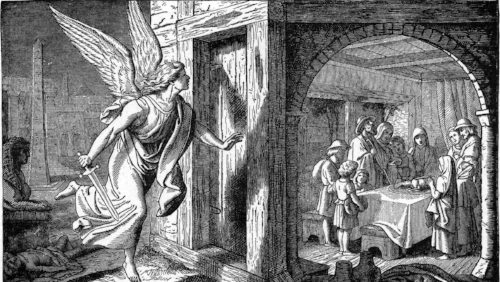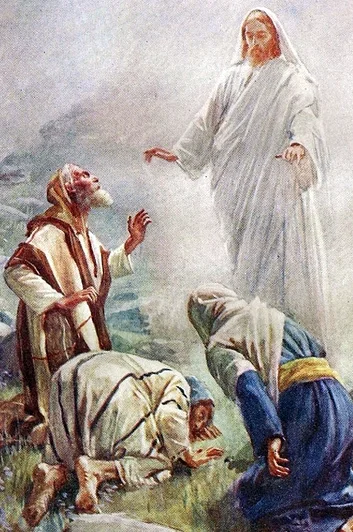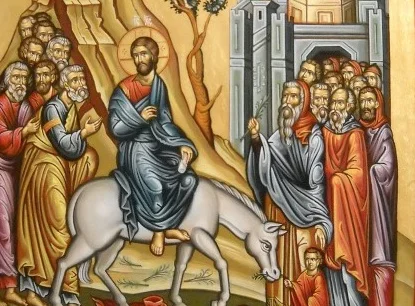Oh, the arguments over this card! At every testing of the game something came up: a footnote in a study bible, a blog entry from a renowned preacher, a comment remembered from a Bible college, an indelible image seared into brain tissue one Sunday morning by an overzealous youth pastor trying to connect with the congregation by spicing up the sermon. And then there is the shock, horror, and confusion of those who had never, no never ever, heard this debate before:
Should the phrase "saw the nakedness of his father" be understood as a sexual euphemism — that Ham committed some sexual act with/to his blackout-drunk father — or does the literal reading hold true — Ham looked at his father's naked body and called his brothers in to observe their father's shame?
Clearly we have chosen the former interpretation. ["But you guys chose that because it fits with your game better: Perverts!"] {You don't know us! Shut it!}
As others have argued both sides of this controversy from critical analysis of the format, analysis of the Hebrew language, and analysis of the cultural milieu of the text, we will only comment from a point of biblical comparison and answer the second most asked question about this text: if Ham was the one who did something wrong, why was his son, Canaan, cursed? (Especially since Canaan wasn't even born yet. [What?] Re-read Genesis 7:6-7 Noah, Mrs. Noah, Noah's sons, and Noah's daughter-in-laws. Nothing is mentioned about Noah's grandkids.)
A few chapters later we encounter another family saved in the nick of time by the hand of God, when everything around them is destroyed — when the land, people, fluffy bunnies, and cute little duckling are wiped off the face of the local map; however, keeping His word, God does not use water. He uses fire.
Lot and his daughters
In Genesis chapter 19 we are presented with the story of Lot, visiting angels, unwise sexual advances and promises, the destruction of Sodom and Gomorrah, and the ending of the story most Sunday school teachers aware of its existence, close the Bible on after declaring that homosexuality is wrong, God will kill you for it, or turn you into salt you look at it ["allelu, alleluia! Let's go eat some cake and sing about Jesus loving all the little children of the world in rainbow colors! Except the Canaanites. Screw their children."].
We will present this closing scene in its entirety:
Now Lot went up out of Zoar and settled in the hills with his two daughters, for he was afraid to stay in Zoar; so he lived in a cave with his two daughters. And the firstborn said to the younger, "Our father is old, and there is not a man on earth to come in to us after the manner of all the world. Come, let us make our father drink wine, and we will lie with him, so that we may preserve offspring through our father." So they made their father drink wine that night; and the firstborn went in, and lay with her father; he did not know when she lay down or when she rose.
On the next day, the firstborn said to the younger, "Look, I lay last night with my father; let us make him drink wine tonight also; then you go in and lie with him, so that we may preserve offspring through our father." So they made their father drink wine that night also; and the younger rose, and lay with him; and he did not know when she lay down or when she rose.
Thus both the daughters of Lot became pregnant by their father. The firstborn bore a son, and named him Moab; he is the ancestor of the Moabites to this day. The younger also bore a son and named him Ben-ammi; he is the ancestor of the Ammonites to this day. (Genesis 19:30-38, NRSV)
Here are the parallels between the stories of our two families in Genesis:
Both live among "sinful" people who are destroyed by the hand of God
Both are rescued as the remnant of (apparently) "righteous" people
Both fathers get blackout drunk after the destruction
Both fathers have something happen to them from the hands of their children while they are incapacitated (we argue that it is sexual in both stories)
Completing the pattern
Both stories go out of their way to name the descendants of the evil-doing children, who become the "bad guys" of the Hebrew narrative during the Exodus from Egypt and entry into The Promised Land.
Form Follows Function
Check the Ancient Near East map in your study Bible and then read through the biblical narrative: Who were the evil, nasty, no good, very bad people who needed to be utterly wiped out, so their land could be passed through and/or inhabited? The Cannanites (Ham's descendants), the Moabites (Unnamed daughter of Lot #1's descendants), and the Edomites (Unnamed daughter of Lot #2' descendants). So what does this have to do with sexual encounters?
These are tales of etiology: stories of origins, reasons, explanations. When the young Hebrews ask,
"why do we hate those people who look pretty much like us, sound pretty much like us, but only dress, eat and worship slightly differently than us, but live not that far away?"
the answer comes back from the text:
"Well my little one, a long time ago, the ancestors of those people did some nasty sexual things that I'll explain when you're older (because I'm afraid you might do them to me); they are people of, because they did things that you just don't do ever. Ever! So don't play with them."
In the Ancient Near East having some form of a sexual encounter with the patriarch of your family — your own father, who you are taking advantage of when he cannot defend himself — is beyond distasteful, beyond taboo. It is absolutely horrific. It is an abomination.It also serves as a great reason for why "we" would attempt the wholesale slaughter of "them" in the name of the Lord: that sort of evil trickles down from generation to generation, it's in the blood. Besides, they're living in the land we want.
This, combined with other arguments, lead us to say we don't know what Ham did, but it was freak nasty, not merely a look-see, inappropriate pointing, and calling of his brothers to gape with him. There was bad-touching involved.
But what do we know: we made this game, and you definitely think we're going to hell now.
Side note: Leviticus 18:7, which employs the same Hebrew phrase for "uncovered...nakedness," is used by the various sides in this debate. Alternately it has been used to argue that Ham had sexual relations of some kind with Noah, that he merely looked at his father's body, AND that Ham slept with Noah's wife (Yes, that would be his mother). But the question remains, which of those things would warrant the cursing of his descendant?



![O Come, O Come Emmanuel (Isaiah 7:14) [An Advent Card Talk]](https://images.squarespace-cdn.com/content/v1/55a9a1e3e4b069b20edab1b0/1483161046976-X5VJE3CMP9T957O72EII/3d-wallpapers-light-dark-wallpaper-35822.jpg)











